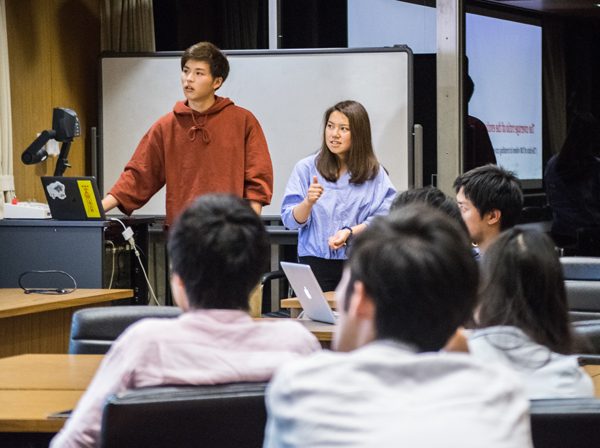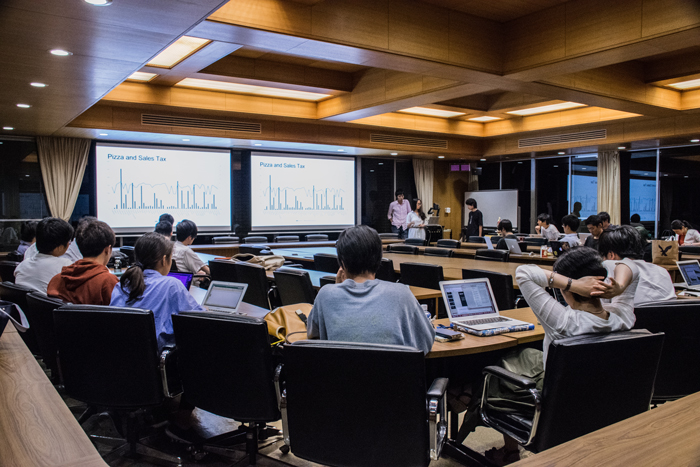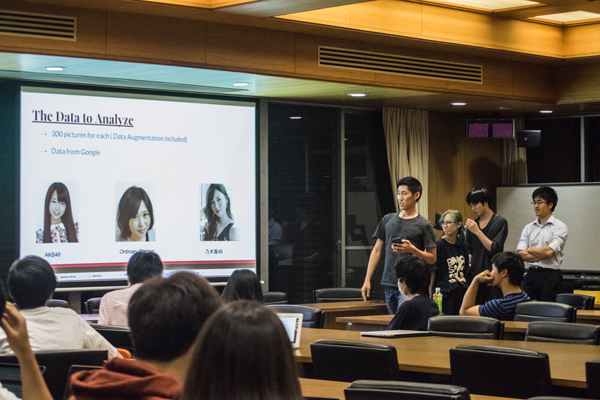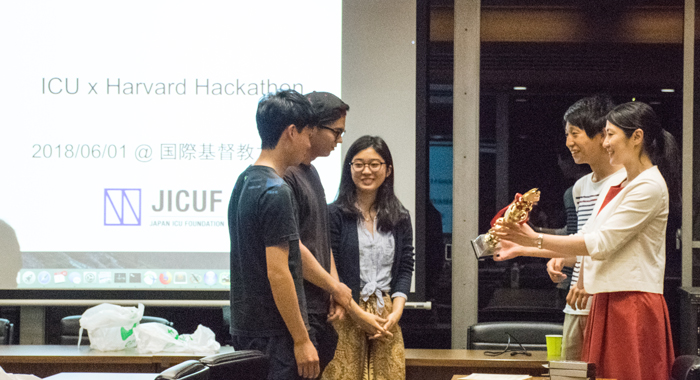JICUF Grantee Highlight: Quantitative Analysis Hackathon Held at ICU in Late May

Dr. Kaori Sato, instructor in the Health and Physical Education program at ICU, received a ¥300,000 grant for her project, “Organizing a Hackathon for Quantitative Analysis with Harvard PhD Students.” Held from May 28 to June 1, 2018, the workshop aimed to inspire ICU students interested both in quantitative analysis and in developing their career abroad. With JICUF funds, Dr. Sato invited PhD students studying bioinformatics at Harvard and Stanford to talk about life as graduate students outside of Japan as well as offer tips on the application process. We asked Dr. Sato to tell us more about her project in her own words.
JICUF: What motivated you to create this program? What are the benefits for the students who participated?
 Dr. Kaori Sato: First, I wanted to connect ICU students and overseas graduate students. Being able to interact with graduate students in Harvard University’s doctoral program who are active with cutting edge technology is always a plus. An advantage is that you can learn the ins and outs of research as well as learn about overseas graduate entrance exams from graduate students. The problem that most students face is that there is little to no exchange with foreign countries.
Dr. Kaori Sato: First, I wanted to connect ICU students and overseas graduate students. Being able to interact with graduate students in Harvard University’s doctoral program who are active with cutting edge technology is always a plus. An advantage is that you can learn the ins and outs of research as well as learn about overseas graduate entrance exams from graduate students. The problem that most students face is that there is little to no exchange with foreign countries.
Also, I thought that the presentation skills are necessary in today’s society. Another issue is that ICU students tend to struggle with Mathematics. Because ICU students aren’t too familiar with math compared to students in other universities, I wanted to change this, even if it meant improving it by a little. I wanted students to understand their strengths and weaknesses in order to expand their possibilities.
JICUF: Could you tell us more about the activities leading up to the Hackathon?
SK: The program began with a lecture and panel presentation from the invited graduate students titled, “Studying Abroad as a PhD Student.” During their presentations, they guests talked about the reasons for pursuing a PhD abroad. They also highlighted the differences in the research environment between Japan and the United States. Finally, they offered ICU students tips on how to prepare for applying to graduate school abroad, including TOEFL, GRE, recommendation letters, etc. We wrapped the panel discussion with an open question-and-answer session.
The graduate students then ran a workshop on programming and statistics basics using Python and R, two popular programming languages used by data analysts and data scientists. Both are free so ICU students were able to do some basic programming themselves during the lectures. Topics that the presenters covered included: Basic Calculations using Python/R; Basics of Probability; Means, Variance, Standard Deviation and Moment; Correlation vs. Causality.
 After introducing this set of terminology to students, the graduate students delved into more complex theories through case-studies and real data application. The fairness of throwing dice, for example, taught students about the principles of Bayes theorem and how they affect prior belief. Other examples included lottery drawing, the Monty Hall problem, and genome data.
After introducing this set of terminology to students, the graduate students delved into more complex theories through case-studies and real data application. The fairness of throwing dice, for example, taught students about the principles of Bayes theorem and how they affect prior belief. Other examples included lottery drawing, the Monty Hall problem, and genome data.
At end of this session, ICU students divided into groups of 3 or 4 people with the same interest in analyzing a theme together. Themes included the correlation of diet data and disease risk, correlation of physiological data and sport performance, Twitter data analysis for prediction model of political decisions, etc. Groups were also encouraged to develop their own themes for data analysis.
The hackathon began at this point as each group applied what they had just learned to themes. Over two afternoon sessions, each group received advice and guidance from the PhD students on how to apply the quantitative analysis tools to their specific theme.

On the final day of the program, each group presented their findings conference-style for 10-15 minutes, including questions and answers. A sample of themes students came up with were: spam email deletion; height estimation based on genetic data; classification of words on social media, etc. At the conclusion of the conference, the panel of graduate students awarded the best presentation a small prize. After closing remarks, all participants joined a small after-party and further networked with each other.
JICUF: It looks like this was a very intensive few days! What advice would you give to the students to engage in these hard activities?
SK: It would be very meaningful and pleasing to me if more students participated in similar activities. I want them to understand their own strengths and incorporate them into whatever they would like to do. I want them to add value to, and become active independent thinkers in, a globalized society.
—
Since 2016, JICUF has awarded over ¥30,000,000 to support projects planned, designed and implemented by ICU faculty and students. The grants initiative is possible thanks to contributions from JICUF’s generous alumni and donors. To read more about the Grants Initiative, go to: www.jicuf.org/funding-opportunities/ or email Program Manager Fernando Rojas at frojas@jicuf.org.



